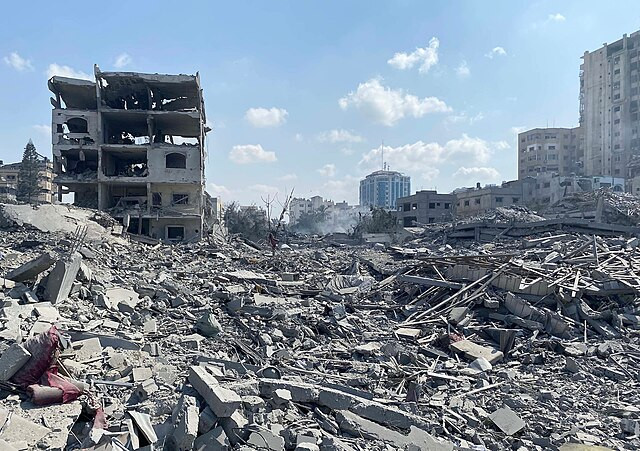Israel launched new strikes on the Gaza Strip on Monday, increasing pressure on Hamas following a weekend attack that targeted the militant group's leadership and resulted in significant civilian casualties in a designated "safe zone." The strikes come amid a broader conflict that has already claimed thousands of lives and continues to displace countless residents.
Two days after the Israeli airstrike turned the crowded area of Mawasi, near Khan Younis, into a scene of devastation, survivors remain in shock and uncertain about their next steps. "Those moments as the ground shook underneath my feet and the dust and sand rose to the sky and I saw dismembered bodies was like nothing I have seen in my life," Aya Mohammad, a 30-year-old market seller in Mawasi, shared via mobile text message. "Where to go is what everybody asks, and no one has the answer."
Mawasi has been a refuge for hundreds of thousands of Palestinians who fled there after Israel declared it a safe zone. The Israeli strike on Saturday was aimed at Hamas military commander Mohammed Deif, a key figure in the October 7 attacks on Israeli towns and villages that sparked the current conflict. Palestinian officials reported that at least 90 people were killed and many hundreds injured in the strike. Reuters journalists on the scene described scenes of carnage, with residents frantically trying to assist the wounded and dead amidst the flames and smoke.
Further south in Rafah, Israeli forces have continued their advance since May, with residents reporting renewed fighting. Medical officials in Rafah stated they recovered 10 bodies of Palestinians killed by Israeli fire, some of which had already begun to decompose. The Israeli military has also escalated aerial and tank shelling in central Gaza, particularly in the Al-Bureij and Al-Maghazi refugee camps, where health officials reported five deaths from an airstrike on a house in Maghazi camp.
The Israeli military claimed that its air forces struck numerous Palestinian military targets across Gaza, resulting in the deaths of many gunmen. According to the military, its forces engaged and killed gunmen in Rafah and central Gaza, sometimes in close combat. The Al-Quds brigade, the armed wing of the Islamic Jihad militant group, confirmed its fighters were engaged in fierce battles in the Yabna camp in Rafah.
The deadly strike in Mawasi, one of the most severe since the conflict began, has cast a shadow over negotiations that both sides previously described as nearing a ceasefire agreement. Despite the devastating impact, a senior Hamas official stated on Sunday that the group had not walked out of the talks. While Israel reported the death of another senior commander in the strike, it has yet to confirm the fate of Mohammed Deif. Hamas officials have denied Deif's death.
The Gaza health ministry reported that at least 38,000 Palestinians have been killed in Israel's military offensive since October 7, with most of the dead being civilians according to officials. Israel claims it has lost 326 soldiers in Gaza and estimates that at least a third of the Palestinian fatalities are fighters. The conflict began following a Hamas-led attack inside Israel on October 7, which resulted in the deaths of 1,200 people, mostly civilians, and the kidnapping of more than 250 hostages to Gaza.
In a separate incident on Saturday, at least 22 people were killed in a strike on a makeshift mosque in a displacement camp in west Gaza City. The head of the emergency room at Al-Ahli Hospital, Dr. Amjad Elewa, reported that 20 men were killed in the initial strike, with two more dying later from their injuries. The strike occurred during noon prayers, leading to serious injuries that required amputation operations.
The UN Human Rights Office commented on the incident, noting that the IDF reportedly struck the mosque shortly after the noon prayer, when many people were still inside or near the mosque. The IDF has not commented on the incident, and there was no report of a prior warning for the attack.
As the conflict continues, the humanitarian situation in Gaza deteriorates. The destruction of infrastructure and civilian casualties raise serious concerns about the safety and wellbeing of the residents. Displaced families like Aya Mohammad's are left searching for safety amidst the ongoing violence.
Israel's actions and Hamas' responses underscore the complexity and deep-rooted nature of the conflict. The international community watches closely, hoping for a resolution that can bring an end to the violence and suffering experienced by so many on both sides of the conflict.




